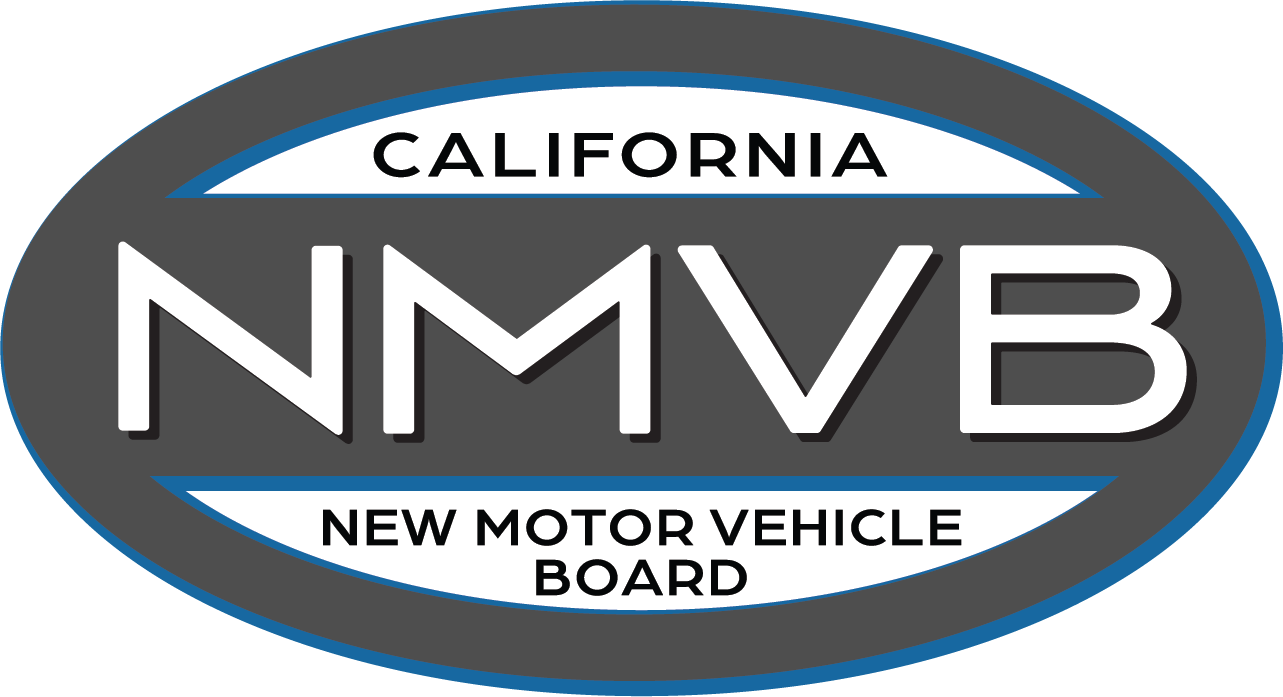Petitions
The Board has jurisdiction to consider any matter concerning the activities or practices of any person licensed as a new motor vehicle dealer, manufacturer, or distributor submitted by any person alleging violations of the Vehicle Code. These matters are referred to as petitions.
Relief Sought
The relief sought is as follows:
- An investigative report by the Department of Motor Vehicles [Veh. Code § 3050(c)(1)];
- A hearing to adjudicate the dispute [Veh. Code § 3050(c)(2)]; and/or,
- An order by the Board to the Department of Motor Vehicles to exercise its authority or power with regards to the issuance, renewal, refusal to renew, suspension, or revocation of the license of any new motor vehicle dealer or manufacturer [Veh. Code § 3050(c)(3)].
Historically, the Board adjudicated all types of disputes between dealers and manufacturers including unreasonable refusal to consent to a buy-sell, unreasonable refusal of a franchisor to approve a relocation, discrimination in the allocation of products, failure to supply products authorized to be sold under the terms of the franchise, breach of contract, breach of the implied covenant of good faith and fair dealing, and other violations. Such petitions requested a hearing before the Board and sought relief in the form of a Board order that required the respondent to either do, undo, or refrain from doing some action that caused harm to the licensee petitioner.
Consumer Verses Licensee Petition
The 2003 decision in Mazda Motor of America, Inc. v. California New Motor Vehicle Board; David J. Phillips Buick-Pontiac, Inc., Real Party in Interest (PDF) (2003) 110 Cal.App.4th 1451, held that the Board lacks jurisdiction in licensee (dealer or manufacturer/distributor) versus licensee (dealer or manufacturer/distributor) petitions in which a hearing to adjudicate a dispute is sought.
This has virtually eliminated all petitions.
Remaining Petition Jurisdiction
The Board does not have jurisdiction to adjudicate licensee versus licensee disputes. These need to be resolved in the courts.
After the decision in Phillips Mazda (PDF), the Board does have jurisdiction to adjudicate consumer versus dealer or manufacturer/distributor petitions.
- This could be a consumer that seeks to informally resolve a warranty or purchase dispute before the Board's Consumer Mediation Services Program, this in turn proves unsuccessful, and then he or she files a formal petition with the Board. However, there is no requirement that the consumer start with the informal process first.
Consumer Verses Licensee Petition
In this type of petition, a member of the public (consumer) seeks a hearing to adjudicate alleged violations of the Vehicle Code by a licensee (dealer, manufacturer, or distributor).
These are reviewed by the Board legal staff and submitted to the full Board for what is called the Board's first consideration.
Section 557 of the Board's regulations provides that "upon the filing of a petition with the board, a copy of the petition shall be transmitted by the executive director of the board to each member of the board for consideration. Unless, within 10 days of receipt of a copy of the petition, any member of the board notifies the executive director of an objection, the executive director shall set the matter for a hearing before an administrative law judge designated by the board."
If there is no objection by any Board member within 10 days of receipt, the Board's Staff Counsel would conduct a pre-hearing conference and proceed with establishing dates for discovery, a mandatory settlement conference, and/or a merits hearing date.
If any Board Member does object to hearing the petition, the petition would be placed on the agenda for the next Board meeting for the full Board to consider whether to exercise jurisdiction over the petition.
Licensee Verses Licensee Petition
If a dealer or manufacturer files a petition that seeks adjudication of a dispute with a dealer or manufacturer for alleged violations of the Vehicle Code, the petition would be reviewed in the normal course and submitted to the Public members of the Board for first consideration.
The petition would be objected to upon first consideration by a Public Board Member because the Board lacks jurisdiction due to the decision in the Phillips Mazda (PDF) case. This matter would be put on the next agenda for consideration by all of the Public Members.
Under section 562(e) of the regulations, the petition would be dismissed without prejudice. This would allow the petitioner to file another petition that seeks relief under section 3050(c)(1) or (3). Or pursue any remedies that may be available through a civil action in Superior Court.
The only relief that is available in licensee vs. licensee petitions is under Vehicle Code section 3050, subdivision (c)(1) and (3).
- Subdivision (c)(1) provides that the Board may "direct the [DMV] to conduct investigation of matters that the board deems reasonable, and make a written report on the results of the investigation to the board within the time specified by the board."
- Subdivision (c)(3) provides that the Board may "order the [DMV] to exercise any and all authority or power that the department may have with respect to the issuance, renewal, refusal to renew, suspension, or revocation of the license of any new motor vehicle dealer, manufacturer, … distributor…"
This type of relief can also be sought in a consumer versus licensee petition.
Upon the filing of this type of petition, it is reviewed by the legal staff and placed on the agenda for the next regularly scheduled Board meeting. These types of petitions are not assigned to an ALJ and are not subject to the normal evidentiary hearing process. In licensee vs. licensee petitions, it is the Public Board Members that would hear from the parties by way of written and oral arguments, and determine whether to grant the relief requested. For a consumer petition, the full Board would participate.

